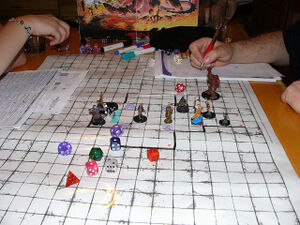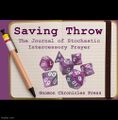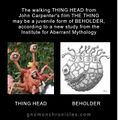Dungeons & Dragons (nonfiction): Difference between revisions
No edit summary |
|||
| (19 intermediate revisions by the same user not shown) | |||
| Line 1: | Line 1: | ||
[[File:Dungeons_and_Dragons_game.jpg|thumb|Game of ''Dungeons & Dragons'' in progress.]]'''''Dungeons & Dragons''''' (abbreviated as '''D&D''' or '''DnD''') is a fantasy tabletop role-playing game (RPG) originally designed by Gary Gygax and Dave Arneson, and first published in 1974 by Tactical Studies Rules, Inc. (TSR). | [[File:Dungeons_and_Dragons_game.jpg|thumb|Game of ''Dungeons & Dragons'' in progress.]]'''''Dungeons & Dragons''''' (abbreviated as '''D&D''' or '''DnD''') is a fantasy tabletop role-playing game (RPG) originally designed by [[Gary Gygax (nonfiction)|Gary Gygax]] and [[Dave Arneson (nonfiction)|Dave Arneson]], and first published in 1974 by Tactical Studies Rules, Inc. (TSR). | ||
== Description == | |||
The game has been published by Wizards of the Coast (now a subsidiary of Hasbro) since 1997. It was derived from miniature wargames with a variation of the Chainmail game serving as the initial rule system. | The game has been published by Wizards of the Coast (now a subsidiary of Hasbro) since 1997. It was derived from miniature wargames with a variation of the Chainmail game serving as the initial rule system. | ||
| Line 17: | Line 19: | ||
== In the News == | == In the News == | ||
<gallery | <gallery> | ||
File:Saving Throw (journal).jpg|link=Saving Throw|'''''[[Saving Throw]]''': The Journal of Stochastic Intercessory Prayer'' is a journal of professional saving throw studies. | |||
File:Playskool's My First DSM (GEBD).jpg|link=Good-Evil bipolar disorder|In Dungeons & Dragons, [[Good-Evil bipolar disorder]] (GEBD) is a mental disorder characterized by periods of loyal service to the Good and periods of abnormally Evil mood that last from days to weeks each. | |||
File:Magical Tree with Lucky Leprechaun.jpg|link=Cereal Tree|[[Cereal Tree]] with Lucky Charms leprechaun. | |||
File:Thing head and Beholder.jpg|link=Thing head and beholder theory|The '''[[Thing head and beholder theory]]''' posits that the walking Thing head from John Carpenter's film ''The Thing'' is a juvenile form of the Beholder from Dungeons & Dragons. | |||
File:Voronoi-diagram-color-commentators.jpg|link=Fantasy Voronoi diagram|1960: [[Nikolay Basov (nonfiction)|Nikolay Basov]] publishes guide to [[Fantasy Voronoi diagrams]], which will influence a generation of Dungeons & Dragons players. | |||
File:Polyhedral dice set.jpg|link=Polyhedral dice (nonfiction)|Squad of [[Polyhedral dice (nonfiction)|polyhedral dice]] ready to play some Dungeons & Dragons. | File:Polyhedral dice set.jpg|link=Polyhedral dice (nonfiction)|Squad of [[Polyhedral dice (nonfiction)|polyhedral dice]] ready to play some Dungeons & Dragons. | ||
</gallery> | </gallery> | ||
| Line 23: | Line 35: | ||
== Fiction cross-reference == | == Fiction cross-reference == | ||
* [[Food alignment matrix]] | |||
* [[Cereal Tree]] | |||
* [[Gnomon algorithm]] | |||
* [[Gnomon Chronicles]] | |||
* ''[[Saving Throw]]'' | |||
* [[The Gnomon Chronicles Game]] | |||
* [[Thing head and beholder theory]] - posits that the walking Thing head from John Carpenter's film The Thing is a juvenile form of the Beholder from Dungeons & Dragons | |||
* [[Scrimshaw abuse]] - falsely correlated with Dungeons & Dragons during the "Satanic scrimshaw" mania of the late 1970s and early 1980s. | |||
* [[The Spirit of Storytelling]] | |||
* [[Uncials]] | * [[Uncials]] | ||
| Line 31: | Line 52: | ||
* [[Gelatinous cube (nonfiction)]] | * [[Gelatinous cube (nonfiction)]] | ||
* [[Polyhedral dice (nonfiction)]] | * [[Polyhedral dice (nonfiction)]] | ||
* [[Saving Throw (game) (nonfiction)]] | |||
== External links == | |||
{{Template:Ext links: Dungeons & Dragons}} | |||
* [https:// | * [https://www.thingiverse.com/mz4250/about Roleplaying miniatures available for free download] by [[Miguel Zavala (nonfiction)|Miguel Zavala]] | ||
** Via Boing Boing: [https://boingboing.net/2019/11/25/huge-selection-of-roleplaying.html Huge selection of roleplaying miniatures available for free download, including Falkor and a bear with sharks for hands] | |||
* [https://boingboing.net/2020/02/10/using-dd-in-therapy-to-get-ki.html Using D&D in therapy to get kids to open up] @ Boing Boing | |||
[[Category:Nonfiction (nonfiction)]] | [[Category:Nonfiction (nonfiction)]] | ||
{{Template:Categories: Dungeons & Dragons}} | |||
Latest revision as of 07:47, 22 August 2023
Dungeons & Dragons (abbreviated as D&D or DnD) is a fantasy tabletop role-playing game (RPG) originally designed by Gary Gygax and Dave Arneson, and first published in 1974 by Tactical Studies Rules, Inc. (TSR).
Description
The game has been published by Wizards of the Coast (now a subsidiary of Hasbro) since 1997. It was derived from miniature wargames with a variation of the Chainmail game serving as the initial rule system.
D&D's publication is commonly recognized as the beginning of modern role-playing games and the role-playing game industry.
D&D departs from traditional wargaming and assigns each player a specific character to play instead of a military formation. These characters embark upon imaginary adventures within a fantasy setting.
A Dungeon Master serves as the game's referee and storyteller, while also maintaining the setting in which the adventures occur and playing the role of the inhabitants.
The characters form a party that interacts with the setting's inhabitants (and each other).
Together they solve dilemmas, engage in battles and gather treasure and knowledge.
In the process the characters earn experience points to become increasingly powerful over a series of sessions.
In the News
Saving Throw: The Journal of Stochastic Intercessory Prayer is a journal of professional saving throw studies.
In Dungeons & Dragons, Good-Evil bipolar disorder (GEBD) is a mental disorder characterized by periods of loyal service to the Good and periods of abnormally Evil mood that last from days to weeks each.
Cereal Tree with Lucky Charms leprechaun.
The Thing head and beholder theory posits that the walking Thing head from John Carpenter's film The Thing is a juvenile form of the Beholder from Dungeons & Dragons.
1960: Nikolay Basov publishes guide to Fantasy Voronoi diagrams, which will influence a generation of Dungeons & Dragons players.
Squad of polyhedral dice ready to play some Dungeons & Dragons.
Fiction cross-reference
- Food alignment matrix
- Cereal Tree
- Gnomon algorithm
- Gnomon Chronicles
- Saving Throw
- The Gnomon Chronicles Game
- Thing head and beholder theory - posits that the walking Thing head from John Carpenter's film The Thing is a juvenile form of the Beholder from Dungeons & Dragons
- Scrimshaw abuse - falsely correlated with Dungeons & Dragons during the "Satanic scrimshaw" mania of the late 1970s and early 1980s.
- The Spirit of Storytelling
- Uncials
Nonfiction cross-reference
- Bag of holding (nonfiction)
- Dice (nonfiction)
- Gelatinous cube (nonfiction)
- Polyhedral dice (nonfiction)
- Saving Throw (game) (nonfiction)
External links
- Dungeons & Dragons @ Wikipedia
- Vin Diesel on Dungeons and Dragons @ YouTube
- D&Diesel with Vin Diesel (Extended Version) @ YouTube
- D&D Vin Diesel - Jimmy Kimmel @ YouTube





